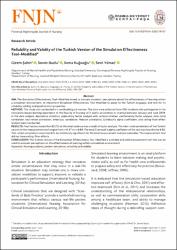| dc.contributor.author | Şahin, Gizem | |
| dc.contributor.author | Buzlu, Sevim | |
| dc.contributor.author | Kuğuoğlu, Sema | |
| dc.contributor.author | Yılmaz, Sevil | |
| dc.date.accessioned | 2020-12-16T10:13:32Z | |
| dc.date.available | 2020-12-16T10:13:32Z | |
| dc.date.issued | 2020 | en_US |
| dc.identifier.citation | Şahin, G., Buzlu, S., Kuğuoğlu, S. ve Yılmaz, S. (2020). Reliability and validity of the Turkish version of the simulation effectiveness tool-modified. Florence Nightingale Journal of Nursing, 28(3), (250-+). https://dx.doi.org/10.5152/FNJN.2020.19157 | en_US |
| dc.identifier.issn | 2147-4923 | |
| dc.identifier.issn | 2147-8686 | |
| dc.identifier.uri | https://dx.doi.org/10.5152/FNJN.2020.19157 | |
| dc.identifier.uri | https://hdl.handle.net/20.500.12511/6092 | |
| dc.description.abstract | AIM: The Simulation Effectiveness Tool-Modified aimed to evaluate students' perceptions about the effectiveness of learning within a simulation environment, to implement Simulation Effectiveness Tool-Modified to adapt to the Turkish language, and test for its reliability, validity, and psychometric properties.METHOD: This study was conducted in a methodological manner. The data were collected from 235 students who participated in the simulation-based learning experience in the Faculty of Nursing of 2 public universities in Istanbul between January and June 2019. In the data analysis, descriptive statistics, exploratory factor analysis with varimax rotation, confirmatory factor analysis, item-total correlation, test-retest correlation, interclass correlation, Pearson correlation, Cronbach's alpha coefficient, and ceiling-floor effect analysis were conducted.RESULTS: Four factors stated that 62.2% of the total variance was a result of factor analysis. The item-total correlations of the Turkish version of the measurement tool ranged from r=0.47 to r=0.69. The total Cronbach's alpha coefficient of the tool was found to be 0.92. Test-retest correlations were found to be statistically significant for the total measurement tool and subscales. The measurement tool did not have ceiling-floor effects.CONCLUSION: The Turkish version of the Simulation Effectiveness Tool-Modified is a reliable and valid measurement tool that can be used to evaluate perceptions on the effectiveness of learning within a simulation environment. | en_US |
| dc.description.sponsorship | Istanbul University - Cerrahpasa Scientific Research Projects Unit | en_US |
| dc.language.iso | eng | en_US |
| dc.publisher | Istanbul University - Cerrahpaşa | en_US |
| dc.rights | info:eu-repo/semantics/openAccess | en_US |
| dc.rights | Attribution-NonCommercial 4.0 International | * |
| dc.rights.uri | https://creativecommons.org/licenses/by-nc/4.0/ | * |
| dc.subject | Nursing Students | en_US |
| dc.subject | Patient Simulation | en_US |
| dc.subject | Reliability and Validity | en_US |
| dc.title | Reliability and validity of the Turkish version of the simulation effectiveness tool-modified | en_US |
| dc.type | article | en_US |
| dc.relation.ispartof | Florence Nightingale Journal of Nursing | en_US |
| dc.department | İstanbul Medipol Üniversitesi, Sağlık Bilimleri Fakültesi, Hemşirelik Bölümü | en_US |
| dc.authorid | 0000-0002-2794-1068 | en_US |
| dc.identifier.volume | 28 | en_US |
| dc.identifier.issue | 3 | en_US |
| dc.identifier.startpage | 250 | en_US |
| dc.identifier.endpage | + | en_US |
| dc.relation.publicationcategory | Makale - Uluslararası Hakemli Dergi - Kurum Öğretim Elemanı | en_US |
| dc.identifier.doi | 10.5152/FNJN.2020.19157 | en_US |



















